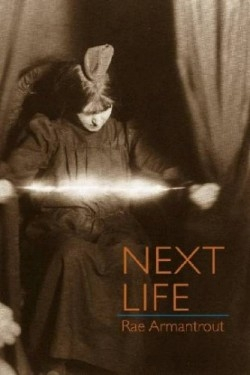Next Life
The publication of a poet’s selected poems is often viewed as a life’s work summation. What better way to rebel against that notion than by releasing a new collection with a title suggesting nothing short of rebirth? Next Life is this poet’s ninth collection, the second to follow her 2001 release, Veil: New and Selected Poems. (It seems Armantrout has no intention of slowing down since her 2004 book, Up to Speed.)
The poem “Make It New” could be her new call-to-arms: “Shaking the parts of speech / like fluff in a snow globe.” These poems are bravely self-conscious, as much about the writing process as the end result. This volume examines and questions the components of poetry, an appropriate maneuver for a poet hailed as one of the pioneers of Language poetry.
Armantrout’s daring extends beyond the examination of process into a realm where directness is paramount. She does not pussyfoot around her subjects. Rather, she asks in “Two, Three,” “Is it the beginning or end / of real love / when we pity a person / because, in him, / we see ourselves?” Also, she calls one poem “Theory of Everything.” Amidst the glut of obscure poetry (some of it actually first-rate), Armantrout’s approach is refreshing. It is not difficult to intuit from this collection how Armantrout was on the frontline of Language poetry, a movement intent on shaking up traditional concepts of poetics. Armantrout even tackles the political in this ever-surprising book of poems; or, at least, President Bush makes an appearance.
Despite their directness, Armantrout’s poems do not pretend to have all the answers. Indeed many of the poems are either deliberately incomplete or full of questions (such as “But are similes reversible?”). Appropriately for a long-time professor of writing at the University of California, San Diego, she does end with a few lines of advice in her closing, title poem: “Be untraceable / but easy to replicate. // Be relative. // Be twice as far / and halfway back.” Who would question advice from such a distinguished source?
Two of Armantrout’s previous books of poetry were finalists for the PEN USA Award in Poetry. Her work has also appeared in numerous anthologies. She is a role model for future poetic rebels, insisting that poetry as an art form is as alive as ever, insisting that poetry (and herself along with it) move into the next life.
Disclosure: This article is not an endorsement, but a review. The publisher of this book provided free copies of the book to have their book reviewed by a professional reviewer. No fee was paid by the publisher for this review. Foreword Reviews only recommends books that we love. Foreword Magazine, Inc. is disclosing this in accordance with the Federal Trade Commission’s 16 CFR, Part 255.

